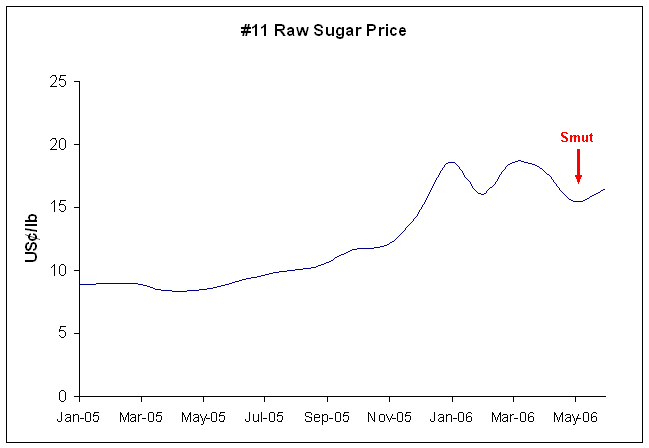Sugar Technology
On-line News |

|
July 2006
Welcome to our news page!
We try to bring you the latest news and comment on this page but it will always be a better place if you send us your news. You can write to us by clicking on the Contact link at the left.
The technical news is clearly dominated by the Queensland smut outbreak; as for the rest, ethanol [or butanol?] is becoming ever more dominant.
STOP PRESS
BRITISH SUGAR
As we went to press British Sugar announced the closure of two of its six factories, effective from the end of the next campaign [i.e. early next year]. The two scheduled to close are Allscott and York. Both are on the
geographic periphery of the company’s operations so there is no realistic hope for the farmers transferring their deliveries.
AUSTRALIAN SMUT
Although smut hit the Ord River valley some years ago it has never been found in Queensland – until last month. Smut was detected ‘on three stools’ on a farm about 40 km from Bundaberg early in the month. The problem is that the
Queensland varieties have never been selected fro smut resistance due to the absence of the disease but the official message was that such a small outbreak would soon be eradicated.
By mid-month the official message was more cautious and by month-end it seemed that the disease had been found on 20 separate farms [and wild pigs were being blamed for the spread of this wind-borne fungus].
Quite interestingly the effect of the news on the world price can be clearly seen on our occasional chart :

It has been said that the upturn from 15 to 16.5 US¢/lb would have been much greater if the [non-technical] traders had not realised that the impact would really only bite in 2006-7. What nobody has told them is the length of time it will
take to swap out the existing varieties for resistant ones at a commercial level.
KINYARA PRIVATISATION
The latest attempt to privatise Kinyara in Uganda seems to be foundering. The tendering was always to be a two stage process with technical proposals opened first and then the price envelopes of those passing the first stage being opened
later. The technical process eventually started in late May amid quite a lot of political posturing and the price stage was scheduled for June 12. This was subsequently delayed until June 23 and then, as that day loomed, was put off ‘indefinitely’.
MADHVANI
The politics surrounding the Kinyara privatisation seemed to be because President Museveni favoured the Madhvani group, owners of the rival Kakira estate, to take over Kinyara. That problem may have gone away however as Madhvani have now
announced [albeit sketchy] plans for a brand new sugar mill in the north.
DUPONT, BP AND BRITISH SUGAR
DuPont has entered into a marketing partnership with British Petroleum and a manufacturing agreement with British Sugar – for butanol. It believes that butanol [C4H90H rather than ethanol’s C2H5OH] is a better fuel to blend with gasoline
than ethanol [less hygroscopic so transportable by pipeline, blendable in higher concentrations without engine modification and more efficient. The problem seems to be that, at least in the short to medium term, it will have to be made from ethanol which
is where British Sugar and its new distillery at Wissington comes in.
DuPont aim to have a biological solution to making butanol by 2010 but it is unclear whether that is also by converting ethanol or whether it is a sugars to butanol route. That might depend on the economics.
CUBA
It looks as if Cuba won’t even make its target of 1.3 million tons this year, due in part to a late start to crop at at least some of the factories. The country now has only 42 operating factories and two thirds of those started late.
At least there seems to be a plan for some the 114 factories shut down in the last four years : Venezuela has announced plans to buy parts of some of them as the cores of new ethanol plants that it intends to build. At the same time Cuba
itself wants to increase its crop to 3 million tons sugar equivalent in order to make ethanol. How is it going to achieve that and find the say $100 million to build the plants?
EASTERN CAPE PHOENIX
According to a press release on the wires last month, the Eastern Cape Beet project seems to have survived its death and arisen, phoenix-like, from the ashes as an ethanol project. At least an ethanol based project is more likely to be successful
than a sugar based one
TPC PROGRESSES WELL
TPC, nestling under the southern flanks of Kilimanjaro, is developing well with all of its new equipment now operational. It is poised to increase production by 20% as this year’s crop is about to start, having invested in both field
and factory. The company has privatised about five or six years ago when a consortium of Mauritian and French [Reunion] companies purchased 75% of the equity from the government of Tanzania.
NEW ESTATE FOR ZAMBIA?
The Zambian government is talking up a new $150 million cane sugar project in the north of the country at Luena in the north east of the country. Both Spanish and Indian investors have been mentioned.
There would be a 10 000 ha core estate and 20 000 ha of outgrower land and the target is to produce 250,000 t/a of sugar or sugar equivalent [ethanol has also been mentioned]. Now that the EU’s EBA programme is becoming a reality and
with Zambia classified as an LDC, the project should be economic.
CARGILL BUYS MORE INTO BRAZIL
Cargill is now backward integrating having just purchased almost two thirds of Cevasa, a sugar and ethanol factory near Ribeirão Preto to the north of São Paulo.



|